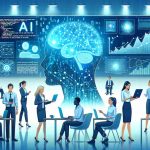An educational summit held in the vibrant city of Alexandria brought together leaders, educators, and school administrators from partner schools to delve into the realm of advancing technologies in education.
Microsoft, a global technology company, played a pivotal role in creating valuable networks within the educational community during the summit. The discussions revolved around key topics such as digital leadership in the era of artificial intelligence, embracing change and empowerment, as well as school management and various artificial intelligence tools that facilitate progress in education.
The summit, attended by over 210 partner schools in Alexandria, acted as a platform for education specialists contributing to the British educational system in Egypt to connect, exchange experiences, and engage in inspiring sessions, talks, discussions, and collaborative activities.
Experts in the field presented interactive sessions on utilizing AI tools to enhance teaching skills, fostering digital leadership, and empowering educators to adapt to a rapidly evolving educational landscape.
The second day of the summit featured engaging discussions on digital safety, enhancing online safety culture for children, and promoting secure digital environments in schools, shedding light on the importance of safeguarding digital spaces for young learners.
In his address, the Director of the British Council in Egypt expressed satisfaction with the strategic educational summit’s success, highlighting the collaboration, exchange of ideas, and celebration of partner schools’ achievements throughout the year.
Educational leaders emphasized the unique platform provided by the British Council’s partner schools summit to shape the future of learning through exploring unprecedented innovative opportunities offered by artificial intelligence.
Educational professionals emphasized the critical role of artificial intelligence in transformative learning experiences, asserting that technological advancements personalized learning, enhanced administrative efficiency, and paved the way for a future where technology amplifies human potential, expanding learning horizons boundlessly.
Globally, British Council partner schools collaborate with over 2,000 institutions, support over 100,000 educators, and impact the lives of approximately one million students. The gathering of schools from across Egypt at this event further strengthens the British Council’s mission of fostering connections, understanding, and trust through education.
Exploring Innovations in Educational Technology: Unveiling Key Insights and Challenges
As the educational landscape continues to evolve, advancements in technology play a pivotal role in reshaping traditional learning methods and approaches. While the recent educational summit in Alexandria shed light on the importance of embracing digital tools in education, there are salient questions that arise when exploring innovations in educational technology.
What are the key challenges associated with implementing educational technology in classrooms?
Integrating educational technology effectively into the classroom setting often poses challenges for educators. Issues such as limited access to devices, inadequate training for teachers, and concerns about data privacy and security are crucial aspects that need to be addressed when adopting new technologies in education.
What advantages do educational technologies bring to the learning environment?
Educational technologies offer a myriad of benefits, including personalized learning experiences, enhanced student engagement, and improved access to resources and information. These tools enable educators to cater to diverse learning styles and create interactive and dynamic learning environments that foster critical thinking and creativity among students.
What are the controversies surrounding the use of artificial intelligence in education?
While artificial intelligence holds great promise in revolutionizing education, there are controversies surrounding issues of data privacy, algorithmic bias, and the potential displacement of human educators. Balancing the ethical implications of AI in education and ensuring equitable access to technology are critical considerations in the ongoing discourse on AI integration in learning environments.
In the realm of educational technology, it is essential to navigate the advantages and disadvantages of digital tools to maximize their potential in enhancing teaching and learning outcomes. By addressing key challenges, exploring innovative solutions, and fostering collaboration among educators, the integration of technology in education can truly revolutionize the way knowledge is acquired and shared in the digital age.
For further insights into the latest trends and developments in educational technology, visit the Edutopia website, a valuable resource for educators seeking to stay informed about cutting-edge innovations in teaching and learning practices.

















